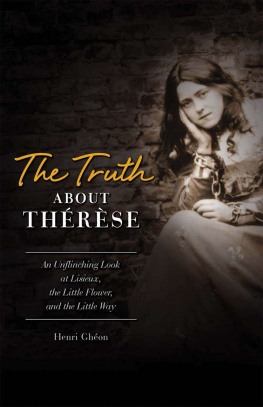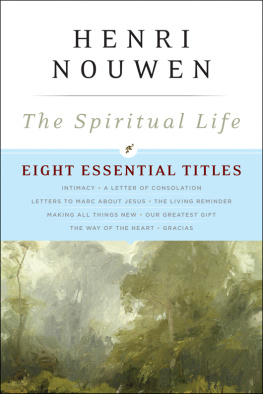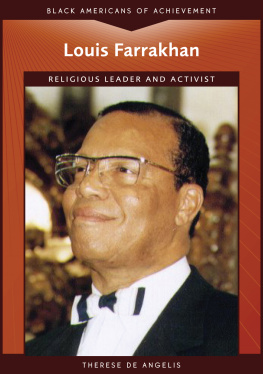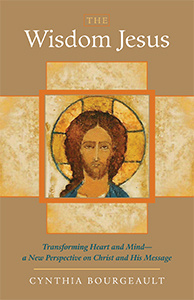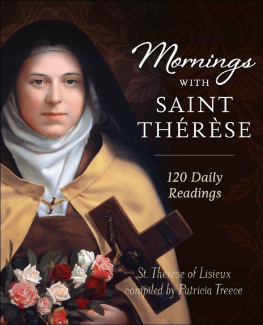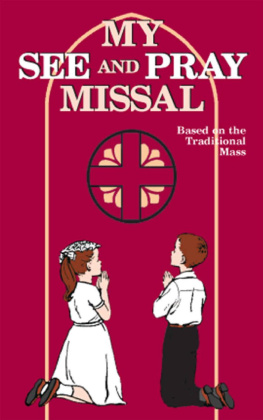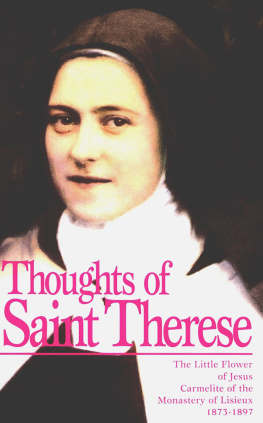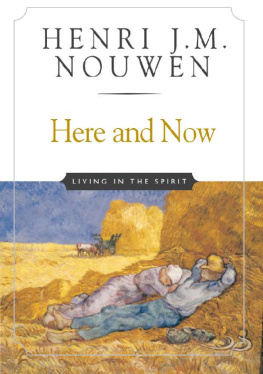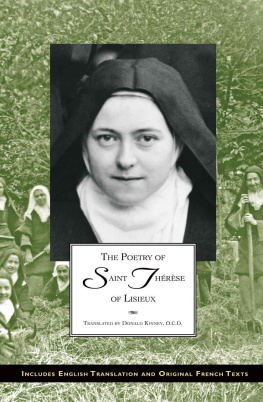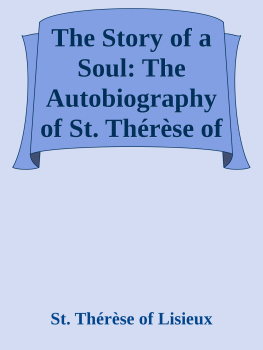Henri Gheon - Truth about Therese
Here you can read online Henri Gheon - Truth about Therese full text of the book (entire story) in english for free. Download pdf and epub, get meaning, cover and reviews about this ebook. year: 2013, publisher: Sophia Institute Press, genre: Science. Description of the work, (preface) as well as reviews are available. Best literature library LitArk.com created for fans of good reading and offers a wide selection of genres:
Romance novel
Science fiction
Adventure
Detective
Science
History
Home and family
Prose
Art
Politics
Computer
Non-fiction
Religion
Business
Children
Humor
Choose a favorite category and find really read worthwhile books. Enjoy immersion in the world of imagination, feel the emotions of the characters or learn something new for yourself, make an fascinating discovery.
- Book:Truth about Therese
- Author:
- Publisher:Sophia Institute Press
- Genre:
- Year:2013
- Rating:5 / 5
- Favourites:Add to favourites
- Your mark:
- 100
- 1
- 2
- 3
- 4
- 5
Truth about Therese: summary, description and annotation
We offer to read an annotation, description, summary or preface (depends on what the author of the book "Truth about Therese" wrote himself). If you haven't found the necessary information about the book — write in the comments, we will try to find it.
Truth about Therese — read online for free the complete book (whole text) full work
Below is the text of the book, divided by pages. System saving the place of the last page read, allows you to conveniently read the book "Truth about Therese" online for free, without having to search again every time where you left off. Put a bookmark, and you can go to the page where you finished reading at any time.
Font size:
Interval:
Bookmark:
The Truth About Thrse
An Unflinching Look at Lisieux, the Little Flower, and the Little Way
Henri Ghon
SOPHIA INSTITUTE PRESS
Manchester, New Hampshire
The Truth About Thrse was formerly published in 1934 by Sheed and Ward, London, under the title The Secret of the Little Flower, using Donald Attwaters translation from the original French. This 2011 edition by Sophia Institute Press includes minor editorial revisions.
Copyright 2011 Sophia Institute Press
Printed in the United States of America
All rights reserved
Cover design by Carolyn McKinney
On the cover: Photograph of Thrse dressed as Joan of Arc, Librairie Thrse de Lisieux, Office Central, Lisieux France.
No part of this book may be reproduced, stored in a retrieval system, or transmitted in any form, or by any means, electronic, mechanical, photocopying, or otherwise, without the prior written permission of the publisher, except by a reviewer, who may quote brief passages in a review.
Sophia Institute Press
Box 5284, Manchester, NH 03108
1-800-888-9344
www.SophiaInstitute.com
Nihil obstat:
Edward Mahoney, S.T.D,
Censor Deputatus
Imprimatur:
+ Joseph Butt, Vicarius Generalis
Westmonasterii, February 1934
p. cm.Originally published: The secret of the Little Flower. London : Sheed and Ward, 1934. With minor editorial revisions and new foreword.
ISBN 978-1-933184-68-5 (pbk. : alk. paper) 1. Thrse, de Lisieux, Saint, 1873-1897. I. Title.
BX4700.T5G52 2010
282.092 dc22[B]2009041835First printing
To my friend Jean Schlumberger, a country neighbor of Sister Thrse, in memory of summers long ago
Foreword
by Philippe Maxence
In his preface to the English edition of Henri Ghons The Secret of the Cur of Ars, G. K. Chesterton noted that the Catholic Church is much too universal to be called international, for she is older than all the nations. This mystery of the Church here finding expression in the manner characteristic of that great writer explains how it comes to pass that a book written by a Frenchman about a saint who was not only French but was also raised by Pope Pius XII to the rank of secondary patroness of France should be reprinted today in the United States.
Its reader even the one who may have opened its cover by chance sees from the very first pages that he has to do with a writer in the truest sense, and that he runs no risk of plunging into the reading of a book that will leave him indifferent or that will simply parrot the tired, syrupy words of the old lives of saints. For in those opening pages, Ghon ranges himself against Ernest Renan (1823-1892), who in the France of the 1930s still enjoyed a kind of moral authority among those who thought that progress had rendered Christianity outworn and reduced Christ to the status of merely one hero among many.
Renan, a former seminarian, belonged to that generation of men that was as much troubled by modern philosophy as it was by the growth of the experimental sciences. It was a generation that failed at the task of putting into an order the various claims of knowledge that were endlessly assailing them. Their faith, austere yet often sentimental, was unable to endure its hour of confrontation with the conclusions of modernity. Nevertheless, with the passage of time, the human heart as a Pascal might say took its revenge. Several years before the conversion of the author of this book, Renans own grandson converted after having descended to the very pit of human misery. The brilliant Ernest Psichari (1883-1914) returned to the Faith not only with a profound adherence to the dogmas of the Church, but also with the desire to make reparation for the blasphemies of his grandfather and for his own fathers misconduct.
This concern for the reparation that the Communion of Saints makes possible is not, however, what shaped the journey of Henri Vaugeon, Ghon by his pen-name. To be sure, his pharmacist father was no believer. He belonged to the provincial French bourgeoisie that looked down its nose at a religion that it considered to be an old womans affair. All that we know of him, however, suggests that he was upright and a man of integrity. He never prevented his wife from giving a religious education to their two children, Henri and Marie.
Their childhood, therefore, was bathed in the gentle warmth of a religious sentiment that was reinforced each day by the familys evening prayers and every week by the ceremonies they all attended, dressed in their Sunday best. Yet in the years of adolescence, of boarding school, and of first love, this uniquely sentimental religion was of no use. For although the affections had been fully nurtured, the intellect had been abandoned like a desert, and the will had not been formed at all. The pious pleasures of an untroubled childhood were incapable of long resisting the call of senses that demanded their due. Because he had been able neither to perceive the truth that is to be known nor to will the good that is to be accomplished, young Henri had in his soul only affections to be satisfied. It was then that he plunged into that perpetual lack of satisfaction that belongs to the insatiable appetite of the flesh.
His friendship with the writer Andr Gide (1869-1951) settled him on a path in which the unbridled quest for pleasure was paradoxically associated with high intellectual standards. A poet and a literary critic, Ghon participated in the 1908-1909 foundation of the Nouvelle revue franaise (New French Review), which at length established itself as the preeminent intellectual forum of the day. While some of its founders posited pleasure as the supreme obligation of their existence, they did not accept it as being the only rule of literature. From the journals first issue, Jean Schlumberger the one to whom this little book would be dedicated many years later expressed this idea by writing that where the exaltation of the artist knows no rule beyond his own pleasure, one finds only unrestrained expression and inner struggles.
Will the reader pardon my so insisting upon the subject of literature in a book devoted to a saint? We must come to the point: The Truth About Thrse is the work of a writer whose personal journey sheds much light upon the books unique character. The mistrust of pious literature that Henri Ghon expresses from the very first chapter rests largely upon his own retrospective regard toward a childhood whose Christianity was too sentimental to allow him to confront the world and its snares with a well-nourished faith. The admiration that he avows for holiness in general and, in particular, for the paradoxical Thrse leads him to demonstrate that literature and holiness are not mutually exclusive. In its own realm, true literature possesses in itself a standard of perfection that one also finds in the realm of sanctity. What is more, this standard of literary perfection allowed him to grasp the truth of Thrse Martin, whose little way of gaining God more quickly he showed to be strong and, in a sense, virile. She did not call for mawkish veneration, he explained. Nor did she put forward a soft and feeble example; everything was strong; she was of the stock of Catherine of Siena and Joan of Arc, and her little way was a heroic way nothing less than plenary love of God and total surrender to Him.
It was while serving as a military physician during the First World War that Henri Ghon rediscovered the Faith, on December 24, 1915, confronted as he then was by death, human misery, tragic losses, and the absurdity of a life without deep meaning. When later he returned to writing but now as a Christian writer he could not produce a precious portrait of the one who had so often been the recourse of the rugged soldiers in the trenches. The publication after the Second World War of the autobiographical manuscripts of the saint has vindicated Ghons approach. The manuscripts show that the little Carmelite was very much of her own time in the choice she made of images to describe the spiritual life, but that she also belonged to all ages, because she was, as Pope Pius XI put it, a living word of God. Henri Ghon captured her secret magnificently: like a true poet he went straight to the very heart of the mystery of Saint Thrse of Lisieux.
Next pageFont size:
Interval:
Bookmark:
Similar books «Truth about Therese»
Look at similar books to Truth about Therese. We have selected literature similar in name and meaning in the hope of providing readers with more options to find new, interesting, not yet read works.
Discussion, reviews of the book Truth about Therese and just readers' own opinions. Leave your comments, write what you think about the work, its meaning or the main characters. Specify what exactly you liked and what you didn't like, and why you think so.

